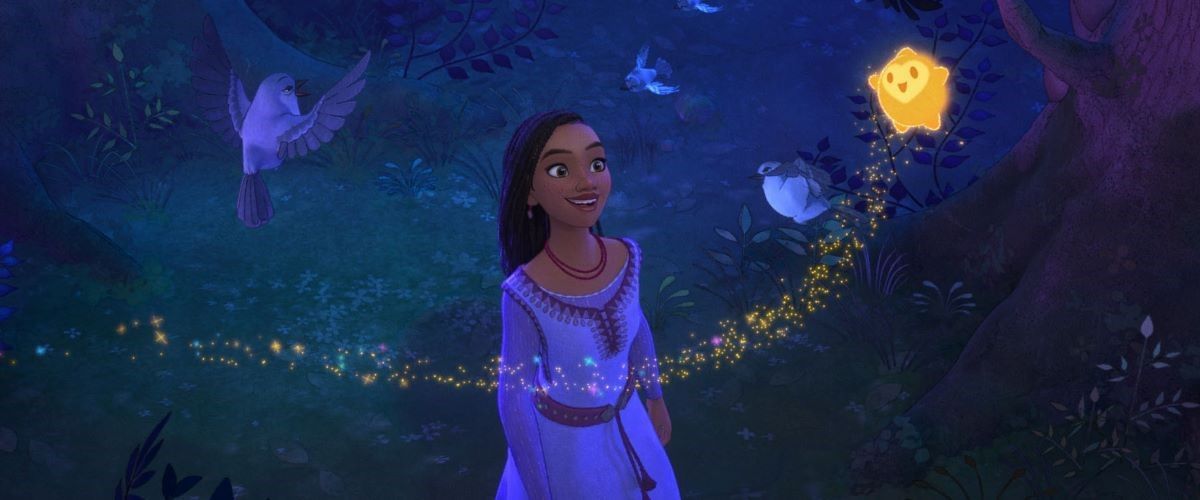Jonah Naplan November 24, 2023
As far as Disney movies, both animated and live-action, of the last five years go, “Wish” is probably one of the more watchable ones. It’s got a solid plot, a couple of catchy tunes, some great voice acting, and intriguing animation. But at its unfortunate center is a manipulative message that only acts as a catalyst to segue into Disney’s 100th Anniversary shindig, an aspect of the film’s plotting that’s most blatant in the final sections. It’s too bad because “Wish” has lots of good ideas trapped between its bookends, and if only the movie didn’t seem coerced to fit into some sort of a contractual mold, they’d probably get a brighter chance to shine.
“Wish” takes place in the whimsical kingdom of Rosas, ruled over by King Magnifico (Chris Pine), keeper of magic and the people’s wishes. He safeguards these orbs in his castle, and makes one of them come true at a monthly ceremony. But on the day that 17-year-old Asha (Ariana DeBose) interviews with the king for a potential apprenticeship, which also happens to be on her Grandpa Sabino’s (Victor Garber) 100th birthday—clever nod there, Disney—she discovers that Magnifico is not actually all that, and is really just a selfish exploiter whose ego takes pleasure in pulling the strings of his kingdom. Disney had the potential to explore all sorts of metaphors with this complex character, but they ultimately blow that opportunity by banishing the villain to shopworn clichés that don’t enhance their argument for why these types of people are inherently evil no matter which way you look at it.
As any typical Disney protagonist would, Asha dashes into the woodlands, belting out the movie’s best tune, “This Wish,” and then starts to formulate her plot to overthrow the corrupt king. For a movie that’s about a rebellious young woman exposing her people to tyranny, “Wish” has enough moments of empowerment to pass muster in theatre workshops and show choirs. Think about what “We Don’t Talk About Bruno” and “Let It Go” have done in years prior to boost Disney’s popularity (if it ever needed to be boosted) in the pop culture industry. Though some of the songs in “Wish” are catchy, I’d be damned if any of them ascend to a second life in the same way that the studio’s most successful—and better—films have.
Of course, this Disney movie wouldn’t be complete without a couple of sidekicks: Asha wishes upon a literal animate star with the verve of something like a Minion or E.T., and the character is supposed to represent the OG wishing star of Disney’s formative years, making us question just how long ago this film is taking place (centuries? eons?). She also has a pet goat named Valentino (Disney favorite Alan Tudyk) who gains the ability to talk through a series of events I don’t think I could explain to you. This set of characters, born into merchandise prospects as a birthright, isn’t especially memorable, but they aren’t horribly unfunny or annoying either, which is always a plus.
As we’d come to expect from the animation studio, the kingdom of Rosas is an aesthetically vibrant setting, and all the characters are rendered in a style that seems to split the difference between three-dimensional and hand-drawn techniques. Are we to believe this is a fusion of Disney’s art styles of past and present? There’s plenty of little details and potential nods throughout “Wish” that have us questioning their intentionality, ultimately distracting from the potency of the larger picture. The biggest and most obvious visual cues come from the last ten minutes that are as clear and plain as they are transactional. By that level of self-infatuation, the screenwriters may as well have positioned a character in front of the camera, begging “Isn’t Disney great?”
The film is not discrete about forcing this sort of propaganda down our throats, and I’d imagine that even Disney adults won’t leave the movie under the desired spell. With “Wish,” the thinking seemed to be “Let’s show the audience how magical we really are, and what we’ve done for their imaginations and personal dreams.” But they forget to incorporate that message organically; instead of letting us self-evaluate our own connection to Disney, directors Chris Buck and Fawn Veerasunthorn tell us how much we love them and to what end.
It is vastly maladaptive for us to watch such a massive entertainment empire, with hands in several of Hollywood’s most successful franchises, pat itself on the back, quixotically idealizing its impact, which is a cruel coverup, especially because most kids going to see “Wish” this weekend do not view Disney as a corporate vacuum, and love it because they grew up on the characters. These types of industry connections are the things only adults will pick up on, which makes us come to the conclusion that the fan service doesn’t matter.
If “Wish” proves, in many strong, successive moments, that it can stand perfectly fine on its own, why do we need a reminder that this is yet another cog in the machinery of the entertainment complex? The best things in “Wish” work as well as they do because they aren’t attached to any asterisks. But by giving the movie such an insincere center, Disney proves themselves a part of the problem, not any less deceiving than the villains of their own stories.
Now playing in theaters.

